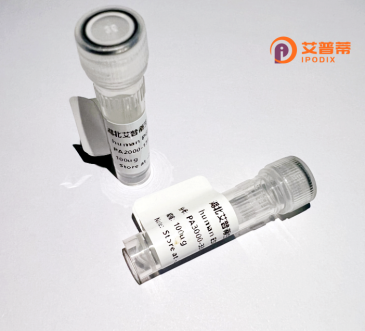
| 纯度 | >90%SDS-PAGE. |
| 种属 | Human |
| 靶点 | SMC2 |
| Uniprot No | O95347 |
| 内毒素 | < 0.01EU/μg |
| 表达宿主 | E.coli |
| 表达区间 | 1-433 aa |
| 活性数据 | MPDYLGADQRKTKEDEKDDKPIRALDEGDIALLKTYGQSTYSRQIKQVEDDIQQLLKKINELTGIKESDTGLAPPALWDLAADKQTLQSEQPLQVARCTKIINADSEDPKYIINVKQFAKFVVDLSDQVAPTDIEEGMRVGVDRNKYQIHIPLPPKIDPTVTMMQVEEKPDVTYSDVGGCKEQIEKLREVVETPLLHPERFVNLGIEPPKGVLLFGPPGTGKTLCARAVANRTDACFIRVIGSELVQKYVGEGARMVRELFEMARTKKACLIFFDEIDAIGGARFDDGAGGDNEVQRTMLELINQLDGFDPRGNIKVLMATNRPDTLDPALMRPGRLDRKIEFSLPDLEGRTHIFKIHARSMSVERDIRFELLARLCPNSTGAEIRSVCTEAGMFAIRARRKIATEKDFLEAVNKVIKSYAKFSATPRYMTYN |
| 分子量 | 73.37 kDa |
| 蛋白标签 | GST-tag at N-terminal |
| 缓冲液 | PBS, pH7.4, containing 0.01% SKL, 1mM DTT, 5% Trehalose and Proclin300. |
| 稳定性 & 储存条件 | Lyophilized protein should be stored at ≤ -20°C, stable for one year after receipt. Reconstituted protein solution can be stored at 2-8°C for 2-7 days. Aliquots of reconstituted samples are stable at ≤ -20°C for 3 months. |
| 复溶 | Always centrifuge tubes before opening.Do not mix by vortex or pipetting. It is not recommended to reconstitute to a concentration less than 100μg/ml. Dissolve the lyophilized protein in distilled water. Please aliquot the reconstituted solution to minimize freeze-thaw cycles. |
以下是关于重组人SMC2蛋白的3篇文献摘要概括:
1. **文献名称**:*"The condensin complex governs chromosome condensation and mitotic transmission"*
**作者**:Hirano, T. et al.
**摘要**:本研究解析了SMC2作为凝聚素复合体核心组分的功能,发现重组人SMC2与SMC4形成异源二聚体,通过体外实验证实其调控染色体高级结构组装和维持基因组稳定性。
2. **文献名称**:*"Reconstitution of mitotic chromatids with recombinant cohesin and condensin complexes"*
**作者**:Shintomi, K. & Hirano, T.
**摘要**:利用重组人SMC2蛋白与伴侣蛋白组装功能性凝聚素复合体,证明其在体外实验中驱动染色质纤维的压缩和有序折叠,揭示了SMC2的ATP依赖性结构重塑活性。
3. **文献名称**:*"Structural basis for SMC2-SMC4 subcomplex organization in the condensin complex"*
**作者**:Gligoris, T. et al.
**摘要**:通过重组表达人SMC2/SMC4复合体并结合冷冻电镜技术,揭示了其异源二聚体的三维结构,阐明了SMC2的卷曲螺旋域在染色体动态压缩中的关键构象变化机制。
以上文献聚焦SMC2在染色体结构调控中的作用及其重组蛋白的功能与结构解析。
The structural maintenance of chromosomes 2 (SMC2) protein is a core component of the condensin complex, essential for chromosome organization and segregation during cell division. Belonging to the SMC family of ATPases, SMC2 forms a heterodimer with SMC4. creating a V-shaped structure that facilitates ATP-dependent DNA loop formation and chromatin condensation. This process ensures proper sister chromatid resolution and mitotic fidelity. SMC2 contains conserved N- and C-terminal nucleotide-binding domains connected by long antiparallel coiled-coil regions and a central hinge domain.
Recombinant human SMC2 is produced using expression systems like bacteria or mammalian cells, enabling biochemical studies on its role in chromosome dynamics, DNA repair, and transcriptional regulation. Dysregulation of SMC2 is linked to genomic instability, cancer progression, and developmental disorders. Its recombinant form aids in exploring condensin's mechanochemical activities, probing mitotic errors, and screening potential therapeutic agents targeting chromosome instability. Research on SMC2 also sheds light on epigenetic regulation, as condensin influences 3D genome architecture. The protein's conserved function across eukaryotes underscores its fundamental role in cellular genome management.
×